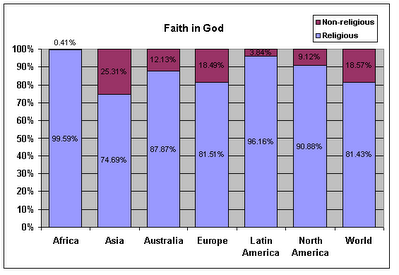Mikaela says:
Despite a new power balance in Congress, we're facing a time of more rampant religious warring in our own country and around the globe.
Fanatics on all sides are being roundly, and perhaps rightly, excoriated for intolerance, fear-mongering, prejudice, and violence.
But let's remember that religion itself is not to blame. Just as all things not taken in moderation can lead to imbalance and disaster, a little belief goes a long way. Believing in the support of a kind, generous, charitable faith community is a good thing. Advocating for a singular definition of the saved and the damned or the good and the evil or believers and non-believers -- well, that's where it becomes dangerous.
Interestingly, despite the Republican co-optation of the religious right as the keepers of all things "moral," American do not in fact have a singular belief in God. An overwhelming majority of Americans do believe in God, just not in the same one. Nor do they agree about how to behave to keep this God happy, if that's even possible, or the extent to which God is involved in our day-to-day lives.
Researchers at Baylor University found that Americans' images of God fall into four categories, which align miraculously, one might say, with particular regions of the country and with voting patterns.
- The South: "Authoritative God" who has strict rules and punishes -- conservative voters (33%)
- The West: "Distant God" who created the universe but isn't involved now -- liberal voters (24%)
- The Midwest: "Benevolent God" who believes in kindness and chartity -- moderate voters (23%)
- The Northeast: "Critical God" who is judgemental but doesn't intervene -- independent and economic conservative voters (16%)
Do we see harbingers of the time when political strategists market God images to attract voters? That might be a whole, huge can of wriggly worms.
 On the positive side, we might begin to understand that as a country full of believers (92% of us), we need as much freedom to pursue our own gods as we need freedom to be all different colors, multiple genders, and the whole spectrum of political beliefs. Perhaps out of desperation, politicians will be forced to concede that their gods, and the gods of those they represent, must coexist with other ideas in order to get elected and rule with justice and compassion in the service of peace and community. Can I get an amen?
On the positive side, we might begin to understand that as a country full of believers (92% of us), we need as much freedom to pursue our own gods as we need freedom to be all different colors, multiple genders, and the whole spectrum of political beliefs. Perhaps out of desperation, politicians will be forced to concede that their gods, and the gods of those they represent, must coexist with other ideas in order to get elected and rule with justice and compassion in the service of peace and community. Can I get an amen?At the very least, even if Americans can't accept or acknowledge that different beliefs co-exist within our country, we can try to remember that our own level of religious belief is NOT like the rest of the world. Each country has its own compendium of beliefs, percentage of believers, and spectrum of fanaticism. Understanding ourselves better would take us a long way toward opening the door for an understanding and tolerance of others. Religions teach community; they can model peace. May we learn to live together and support each person's right to believe. Our lives depend on it, no matter what you believe.


Compiled from: Encyclopedia Britanica's Adherents of All Religions by Six Continents

Source: World Religions Project (Click here for full resolution PDF version)





|